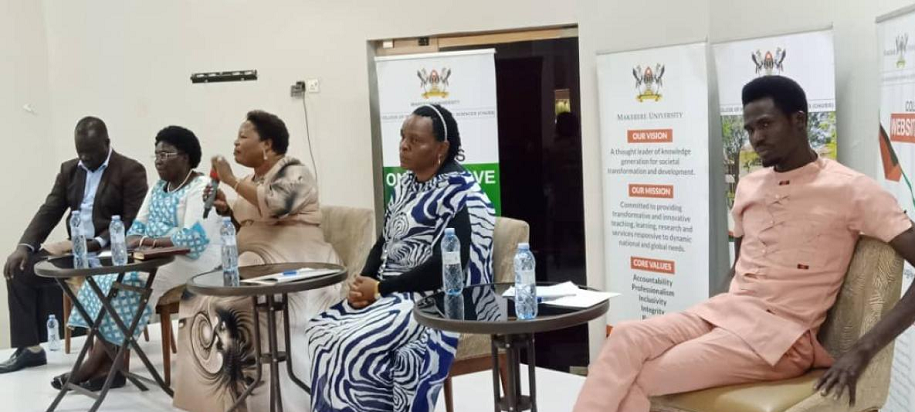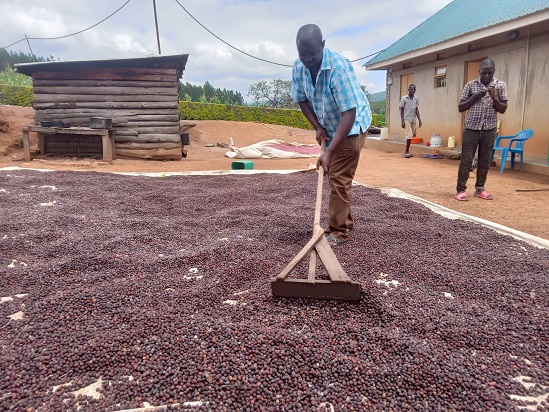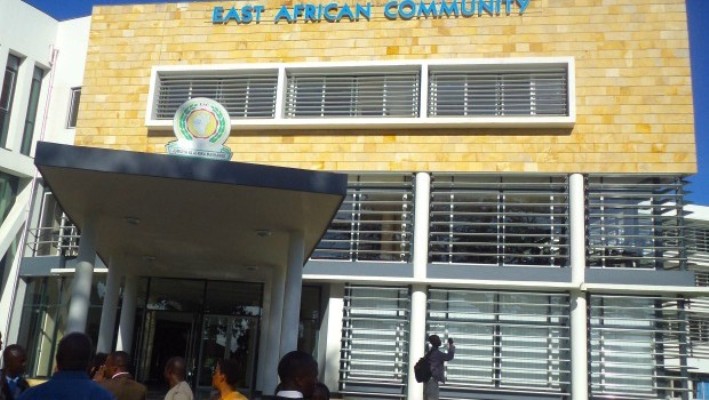Panelists discussing the Aguu question in Acholi: (L to R), Dr. Ben Adol Otto, a community development specialist, Gulu City Woman MP, Betty Aol Ochan, the RCC Gulu, Jane Francis Amongin Okili, Minister, Mutuzo and Patrick Ochan
A former street child in Gulu, Patrick Ocen has pleaded with the government and authorities when dealing with the Aguu/street children question in the City and Northern Uganda. He believes the issue is too complex and that those young people who were victims or survivors of the war have many questions that the authorities have failed to answer.
He brings up some of those issues as he shares his personal story of growing up without knowing his father and clan mates. “I come from a family that had a very beautiful young girl who became my mother many years ago. But something happened; she became a victim of rape. In her story, she said she was raped by five men” narrates Ochen, who says he doesn’t know his biological father or clan.
“That fateful night, she was with the elder sisters and the follower and she was carried when she became unconscious. She realized this after two days. And she found herself very deep in the bush. And she conceived and gave birth to twins and one of the twin persons happened to be me,” narrates Ochen, a student at Gulu University.
Ochen hates labeling the youthful boys thriving from the streets of Gulu as the Aguu. Aguu in Acholi particularly Gulu City is a group of street youth/children who are known for fomenting violent crimes. In Lira and Lango, they have been labelled Owukwuk meaning they can ransack and turn their victims upside down and flee with all valuables.
The School of Women and Gender Studies referred to those youthful persons as “The floating population”
However, Ochen prefers that they be referred to as the socially excluded youth. From the School of Women and Gender Studies, the question of Aguu manifests at the intersection of the critical deficits in the reconstruction process which manifests as markers of an erosion of cultural identity and a desperate search for alternative. Ochen is free to narrate his story so that people understand his ordeal and those of thousands of others who cannot trace their fathers or clan years after the end of the war waged by the Lord’s Resistance Army (LRA) commandeered by Joseph Kony.
As many as 25,000 children had been abducted by the LRA since the conflict began, for use as soldiers, sex slaves, and porters.
At the peak of the LRA war in 2003, thousands of children would trek from the Internal Displaced Persons Camps (IDP) to Gulu town for safety fearing abduction by the LRA. They came to be known as “night commuters”. Some of those still live in Gulu city.
Ochen was born in the jungles somewhere in South Sudan formerly part of Sudan so he was not among the night commuters. “She raised me with an unknown father. You don’t know the father of your twins. I remember when I was five, I didn’t know what towns and trading centers looked like. The only thing I knew was sleeping in the bush, hearing birds sing in the air,” Ochen remembers.
Further, Ochen narrates that his mother with her two children tried to escape from captivity. “Unfortunately, she was captured with a team of mothers and taken back to the rebels barracks. That is now in South Sudan. She was beaten terribly. I was on the head with a red-heated panga. That is why I don’t shave my hair,” he said.
Ochen’s hair is smartly kept, with no dreadlocks. When he made this narration, he was wearing a fitting pink shirt. One would not associate him with the troubled past but there he was. He went on with his tales of living in the LRA camps and later how his mother departed from the world.
“Unfortunately, the woman turned to become soil again (die). She left me in the hands of a friend who later on in 2000 came back with me from Sudan. By then there was a rehabilitation centre in Lira called Rachel Rehabilitation Centre. I stayed there for some time, but because you don’t know who your father is, tracing for the paternal family became a challenge to the center,” Ochen takes us deeper into his past.
He was excited that some people who knew his mother knew where she came from and where his maternal grandmother lived. “Grandmother came and picked me. Unfortunately, the old woman died after three days. That is where the genesis of this thing started. The uncles said we can’t keep this boy here. He will grow and begin struggling for land. This is a spirit’s son we don’t know the origin. They started by starving me for three days then I left,” he said.
He would begin the journey from Payimol to Kalongo. “By then there was this pickup that did business. I lied to them that I was going to Kitgum. I said I will pay from there. Reaching Kitgum, I just took off. I found fellow children that were born from captivity that were also chased from home,” he said. “We were six of us. I became the ring leader but unfortunately, four of them were killed. We remained two and that is how the street hustles began.”
Ochen has been working for “socially excluded people” (Aguu) for the last eight years. “I became an activist. Even from high school. And I was focusing on children born in captivity. These are the children whose mothers were abducted, and some of them as a result of rape. Others don’t know their maternal families, others don’t know their paternal families.” He said the issue of socially excluded youth in Gulu “Aguu” is very complex.
“Someone comes from a venerable environment what do you expect from such a person? Do you expect that person to live normally? That is where the issue of criminality comes in,” said Ochen, who says he has written on the Gender Dimensions of Aguu (Socially Excluded Youth) in Gulu City, Northern Uganda. “Even themselves they don’t like the name Aguu. If you call them so in the night they will follow you.”
He said while it is generally known that the Aguu are homeless persons in Gulu, some of them have homes. “No one should say that these people are homeless. The LC I chairperson in one of the cells in Gulu, the zone is an Aguu, one of the lecturers at Gulu University, the child is in primary six. He is typical Aguu.”
A study whose findings were published in the Journal of Human Security in 2021 concluded that referring to the Aguu today as a criminal entity and in derogatory terms, without distinguishing between the original Aguu, the multiple identities and activities of street youth/children at large in Gulu, processes of change in Gulu, the multiple identities and activities of those who use the Aguu for various purposes, leads to treating the Aguu today as a homogenous entity, and subsequently to discourses that point to a surface that looks deviant and criminal, but in reality overlooks complexity, multiplicity and fluidity.
Dr. Ben Adol Otto, a community development specialist working with Advocates for Research in Development (ARiD) agrees that like they have discouraged certain terms like victims in gender-based violence, there is a need to view the concept of Aguu in new terms. “Now that we know that this is a group that has this chaotic origin, and identity, if we continue to give them separate identities and institutionalize them separately are we not incentivizing? Lets like it to war on terrorism,” suggests Adol Otto.
-URN





